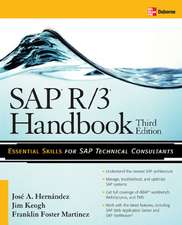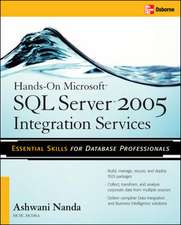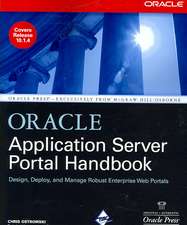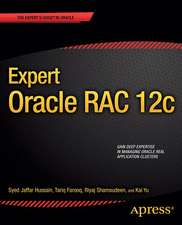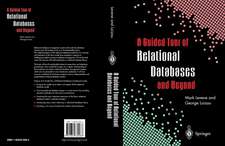Client Data Caching: A Foundation for High Performance Object Database Systems: The Springer International Series in Engineering and Computer Science, cartea 354
Autor Michael J. Franklinen Limba Engleză Hardback – 31 mar 1996
This monograph investigates several fundamental aspects of the emerging generation of database systems. It describes and investigates implementation techniques to provide high performance and scalability while maintaining the transaction semantics, reliability, and availability associated with more traditional database architectures. The common theme of the techniques developed here is the exploitation of client resources through caching-based data replication.
Client Data Caching: A Foundation for High Performance Object Database Systems should be a value to anyone interested in the performance and architecture of distributed information systems in general and Object-based Database Management Systems in particular. It provides useful information for designers of such systems, as well as for practitioners who need to understand the inherent tradeoffs among the architectural alternatives in order to evaluate existing systems. Furthermore, many of the issues addressed in this book are relevant to other systems beyond the ODBMS domain. Such systems include shared-disk parallel database systems, distributed file systems, and distributed virtual memory systems. The presentation is suitable for practitioners and advanced students in all of these areas, although a basic understanding of database transaction semantics and techniques is assumed.
| Toate formatele și edițiile | Preț | Express |
|---|---|---|
| Paperback (1) | 984.04 lei 6-8 săpt. | |
| Springer Us – 26 sep 2011 | 984.04 lei 6-8 săpt. | |
| Hardback (1) | 990.30 lei 6-8 săpt. | |
| Springer Us – 31 mar 1996 | 990.30 lei 6-8 săpt. |
Din seria The Springer International Series in Engineering and Computer Science
- 24%
 Preț: 1041.97 lei
Preț: 1041.97 lei - 20%
 Preț: 643.50 lei
Preț: 643.50 lei - 18%
 Preț: 1225.62 lei
Preț: 1225.62 lei - 18%
 Preț: 965.02 lei
Preț: 965.02 lei - 20%
 Preț: 646.12 lei
Preț: 646.12 lei - 18%
 Preț: 948.79 lei
Preț: 948.79 lei - 20%
 Preț: 646.62 lei
Preț: 646.62 lei - 15%
 Preț: 637.46 lei
Preț: 637.46 lei - 20%
 Preț: 643.83 lei
Preț: 643.83 lei - 18%
 Preț: 949.23 lei
Preț: 949.23 lei - 20%
 Preț: 644.48 lei
Preț: 644.48 lei - 20%
 Preț: 994.92 lei
Preț: 994.92 lei - 20%
 Preț: 645.97 lei
Preț: 645.97 lei - 18%
 Preț: 946.87 lei
Preț: 946.87 lei - 20%
 Preț: 995.57 lei
Preț: 995.57 lei - 18%
 Preț: 956.99 lei
Preț: 956.99 lei - 20%
 Preț: 644.98 lei
Preț: 644.98 lei - 15%
 Preț: 649.54 lei
Preț: 649.54 lei - 18%
 Preț: 950.21 lei
Preț: 950.21 lei - 18%
 Preț: 1221.38 lei
Preț: 1221.38 lei - 18%
 Preț: 957.62 lei
Preț: 957.62 lei - 15%
 Preț: 643.99 lei
Preț: 643.99 lei - 18%
 Preț: 948.47 lei
Preț: 948.47 lei - 18%
 Preț: 947.35 lei
Preț: 947.35 lei - 20%
 Preț: 1284.65 lei
Preț: 1284.65 lei - 20%
 Preț: 1628.31 lei
Preț: 1628.31 lei - 20%
 Preț: 1285.78 lei
Preț: 1285.78 lei
Preț: 990.30 lei
Preț vechi: 1237.87 lei
-20% Nou
Puncte Express: 1485
Preț estimativ în valută:
189.49€ • 197.84$ • 156.83£
189.49€ • 197.84$ • 156.83£
Carte tipărită la comandă
Livrare economică 04-18 aprilie
Preluare comenzi: 021 569.72.76
Specificații
ISBN-13: 9780792397014
ISBN-10: 0792397010
Pagini: 216
Ilustrații: XIV, 216 p.
Dimensiuni: 155 x 235 x 14 mm
Greutate: 0.51 kg
Ediția:1996
Editura: Springer Us
Colecția Springer
Seria The Springer International Series in Engineering and Computer Science
Locul publicării:New York, NY, United States
ISBN-10: 0792397010
Pagini: 216
Ilustrații: XIV, 216 p.
Dimensiuni: 155 x 235 x 14 mm
Greutate: 0.51 kg
Ediția:1996
Editura: Springer Us
Colecția Springer
Seria The Springer International Series in Engineering and Computer Science
Locul publicării:New York, NY, United States
Public țintă
ResearchCuprins
1 Introduction.- 1.1 Background and Motivation.- 1.2 Overview.- 1.3 Organization.- 2 Client-Server Database Systems.- 2.1 Architectural Alternatives.- 2.2 Reference Architecture.- 2.3 Utilizing Client Resources.- 2.4 Related Systems.- 3 Modeling a Page Server DBMS.- 3.1 Model Overview.- 3.2 Client-Server Execution Model.- 3.3 Database and Physical Resource Model.- 3.4 Workload Models.- 3.5 Experimental Methodology.- 4 Client Cache Consistency.- 4.1 The Consistency Maintenance Problem.- 4.2 A Taxonomy of Consistency Protocols.- 4.3 Cache Consistency Maintenance Algorithms.- 5 Performance of Cache Consistency Algorithms.- 5.1 System Configuration and Workloads.- 5.2 Server-based 2PL and Optimistic 2PL.- 5.3 Callback Locking.- 5.4 Related Work.- 5.5 Chapter Summary.- 6 Global Memory Management.- 6.1 Introduction.- 6.2 Algorithms for Global Memory Management.- 6.3 Experiments and Results.- 6.4 Related Work.- 6.5 Chapter Summary.- 7 Local Disk Caching.- 7.1 Utilizing Client Disks.- 7.2 Designing an Extended Cache.- 7.3 Extended Cache Performance.- 7.4 Algorithm Extensions.- 7.5 Chapter Summary.- 8 Towards a Flexible Distributed DBMS Architecture.- 8.1 Data Granularity.- 8.2 Peer-to-Peer Architecture.- 8.3 Integrating Data-shipping and Query-shipping.- 9 Conclusions.- 9.1 Summary of Results.- 9.2 Future Work.- References.


